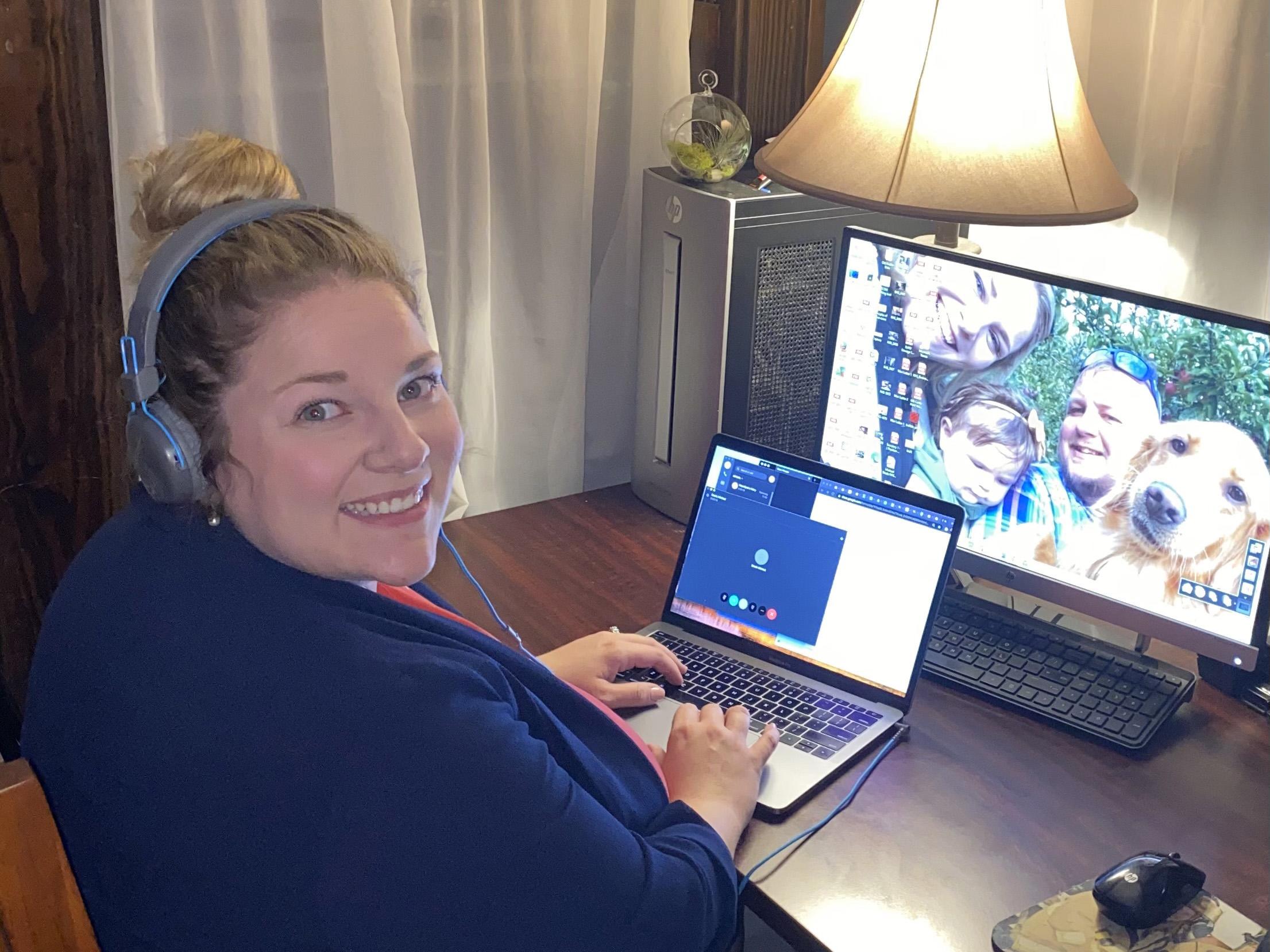Hotline teamwork -- Alyssa Steele, coordinator of New Student Orientation, was part of a campus-wide team that rapidly came together to provide a COVID Hotline for concerned parents, students and friends. Steele, who is one of 30 staff who take time to work with callers, coordinated the logistics, staffing and training for the Hotline.
A new COVID Hotline came together through the quick work and leadership of a dedicated cross-campus team.
Vice President for Student Affairs and Dean of Students Jerri Howland spearheaded an effort to serve students and parents who had questions about how the college is adapting to the pandemic -- and moreover could benefit from a reassuring human voice.
The COVID Hotline -- 315-312-3333 -- is staffed weekdays from 8 a.m. to 5 p.m. as part of a large-scale campus collaboration.
As the number of COVID-19 cases rose, Chief Technology Officer Sean Moriarty and the Campus Technology Services team noticed another figure increasing -- the volume of calls from concerned parents seeking answers and guidance. Calls flooded the college switchboard and Health Services office.
“What made the situation difficult was that people were phoning with questions that spanned several units within the college,” Moriarty noted. “To really answer people's questions it seemed that we needed to gather answers from several units in the college and share those answers with the people calling.”
Vice President Howland quickly began recruiting a team, working with others across campus, and many people and departments stepped up. An initial meeting that featured student affairs leaders, Moriarty and CTS representatives, Associate Provost Rameen Mohammadi, Vicki Furlong from finance and administration, and the college’s Office of Communications and Marketing took place on Tuesday, Sept. 15 -- and the quick work of dozens of staff members had the hotline up and running by Friday, Sept. 18. Calls peaked the first week, but the team has answered hundreds of calls in all.
“I am happy to say the team just jumped right in and we started working on making this happen,” Moriarty said. “A team in CTS started immediately working on the back end phone system and configuring phones throughout the campus to answer the Hotline. It was amazing how people came together to ensure we could give quality answers to the people who would be calling.”
Centralized information
Katherine Wolfe-Lyga, director of the Counseling Services Center, jumped in to start gathering information from subject experts around the college.
“This is a large institution with a lot of moving parts, so having Dr. Howland create the hotline has improved the response time to callers' questions, as well as the accuracy of the most current information,” Wolfe-Lyga said. “Additionally, while we understand many callers are experiencing intense worry, some hotline staff have indicated that some folks are calling with gratitude about the college's efforts to keep them informed and keep our campus safe.”
Kathleen Evans, assistant vice president for student development, worked on gathering a team, even as she also was very involved in logistics for the COVID-19 testing in Lee Hall.
“In this time of uncertainty and ever changing situations, people are desperate to have someone to connect with and ask direct questions,” Evans said. “I believe it demonstrates the genuine compassion we have for our campus community, including parents.”
Evans recruited Alyssa Steele, coordinator of New Student Orientation, to coordinate the logistics, staffing and training for the COVID Hotline. This means working with dozens of staff members who provided their time to answer calls, provide information and foster reassurance.
“I think that students and families feel heard when they call the Hotline,” Steele noted.
Even if the person receiving does not have the answer, they take contact information for the caller, and work through Steele to get an answer and get back to the caller.
Creating connections
“The Hotline is just one piece of the institutional puzzle of efforts related to keeping our campus safe, well and informed,” Steele said. “In many ways, our students and families may feel disconnected from one another, especially since they cannot be in physical contact right now. The Hotline provides a way for folks to receive a near-immediate answer, reducing the feeling of disconnectedness.”
“The college has worked hard to maintain as much continuity of services as students have come to expect,” Wolfe-Lyga said. “Having more opportunities to centralize information is useful because we know that students are overwhelmed and oversaturated with emails and social media accounts. Creating more accessibility for connecting to information will hopefully yield a greater sense of cohesion for the student or family member reaching out to the Hotline.”
Steele marveled at watching Howland lead a training on Thursday evening, Sept. 17, to a team of around 30 staff members that came together within two days, ready to give their all to this new effort.
“I have been inspired not only by the resiliency and adaptability of our students, but the sheer commitment of our staff to support our students and their families,” Steele said. “Last week, our Chief Technology Officer (Moriarty) was answering phone calls on the Hotline himself. … Our communications team is working round the clock to deliver and post useful, accessible information.”
Steele has even seen her supervisor, Evans, involved in administering saliva testing, in what became an all-hands-on-deck effort.
While Howland was quick to assign credit to members of the student affairs team, Evans said the vice president’s leadership encouraged staff from many departments to become so involved in the planning and staffing roles.
“The people that are staffing the hotline are already working a lot of extra hours because of the pandemic, and are graciously sacrificing even more of their personal time to staff the hotline in the evenings and over the weekends,” Evans said. “We have an incredible team at Oswego who are always willing to go the extra mile."




